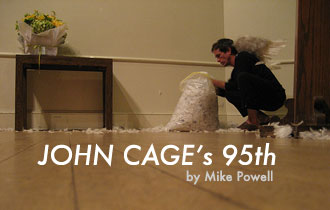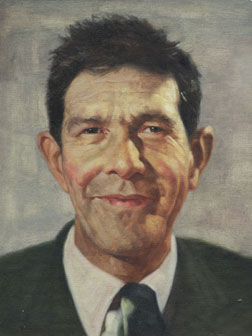John Cage’s 95th
20.09.07
 John Cage’s 95th Birthday
John Cage’s 95th Birthday
The Kitchen NYC, Sept. 5th 2007
A 1963 radio talk with the American composer John Cage begins with the interviewer reading one of Norman Mailer’s digressions on a boxing match: “I had a moment of vast hatred then for that bleak, gluttonous void of the establishment, that liberal power at the center of our lives, which…substituted the intolerance of mental health for the intolerance of passion, alienated emotions from its roots and man from its past, cut the giant of our arts to fit a bed of procrustes, Leonard Bernstein on the podium, John Cage in silence…existing as canned butter would to butter.”
After a three-minute meditation on finding sobriety of the mind, John Cage confesses he has no idea what Mailer is talking about. Embarrassed by the simplicity of Cage’s admission, the interviewer nervously thumps his own idiot chest: “Passion is intolerable, I suppose.” (They are two people in a room, having no idea what Norman Mailer is talking about.) “But I’m not dealing with passion,” Cage replies. “And I’m not dealing with tolerance.” He dissolves into a giggle.
Walking to the Kitchen to see John Cage’s 95th birthday concert, I notice I’m accidentally following someone. This produces anxiety. I grew to be over six feet tall and my legs are significantly longer than my torso; trying to shorten my stride would suggest to passerby that there is a rod in my ass. We keep crossing the streets to avoid the other. At a certain point, it becomes clear he’s going to the Kitchen as well––I almost interrupt his solitude to talk to him about the performance. By the time I reach the door, he’s gone. I sit down alone and think about hot sauce.
A butch-looking girl wearing a winter vest––it is not cold out––takes a seat three down from me. Her name is Jo, she is a college student of some kind, and she cannot believe how many people she knows here. “This is crazy,” says Jo. “I know so many people here!” There is, admittedly, a homogeneity of attendees: college-age or post-collegiate scrubs taking in an anniversary concert for the most controversial composer of the 20th century, a real event-type event. There’s an old biker-looking couple wearing extraordinarily long earrings. Two girls next to me are silent for a very long time and then start speaking in German. “Hey,” Jo bleats across the aisle. “I’m Jo! Remember me?”
 John Cage’s primary achievement as a composer was to inspire a gentle, constant focus from the listener. By structuring music from silence, he forced attention to the margins: ambience, chatter, chance––20th century ideals that eviscerated then-tawdry shit like The Eternal. When he covered piano strings with cork and wooden blocks––an interference––he rubbed out lines between non-musical objects and musical ones. The lump sum of experiencing John Cage is a transparency of mind. No distractions and no wrong notes; weightlessness and pointlessness. There is no capitulation or chorus or ringtone or dramatic event. (After the concert, someone sniffed at true understanding: “The guitarist was almost too memorable.”) For nights after, I slept with earplugs in, having unearthed a disturbing appetite for random traffic noise.
John Cage’s primary achievement as a composer was to inspire a gentle, constant focus from the listener. By structuring music from silence, he forced attention to the margins: ambience, chatter, chance––20th century ideals that eviscerated then-tawdry shit like The Eternal. When he covered piano strings with cork and wooden blocks––an interference––he rubbed out lines between non-musical objects and musical ones. The lump sum of experiencing John Cage is a transparency of mind. No distractions and no wrong notes; weightlessness and pointlessness. There is no capitulation or chorus or ringtone or dramatic event. (After the concert, someone sniffed at true understanding: “The guitarist was almost too memorable.”) For nights after, I slept with earplugs in, having unearthed a disturbing appetite for random traffic noise.
The concert itself, what was it? A bunch of people were onstage playing several Cage pieces at one. A woman read some words about government. I think they belonged to Thoreau. A girl and boy drank milk and then exchanged pants. There was a video projected on the wall of some people looking stern, then smiling, then almost kissing. It was not that interesting. Notes blinked like fireflies in the darkness. The score for one of the pieces, “Atlas Eclipticalis,” is made up of musical staves superimposed on star charts from an atlas. Brightness dictates loudness and length. The writer and critic Peter Yates once compared Cage’s music to watching stars in the sky––without pattern or end, always perceived a little bit differently. Nobody realized 90 minutes had passed, so we all sat there and kept listening. Nobody coughed or farted or anything.
Cage proposed peace from constant change. Before the musicians started playing, I listened to a girl fill up space on what sounded like a first date. “My granddad was Native American. I mean, really. He was in westerns. With John Wayne, once, I think.” “Really? Have you seen them?” I said. “Yeah, I have. I mean, you can’t see him, there’s just a whole slew of Indians charging over this hill, so I couldn’t really pick him out. Plus, that was a long time ago. Last time I saw him was at his birthday party. He showed up in a purple shirt and suspenders and a huge mustache. I asked him what the mustache was about and he just said ‘I dunno, it was time for something different.’” On the way home from the Kitchen, I became convinced I was accidentally following someone again. I moved slowly and lightly and reveled in what we call coincidence.
Cover Photo: "Yoko Sent Flowers" from Western Wesley’s flickr (taken at the event)